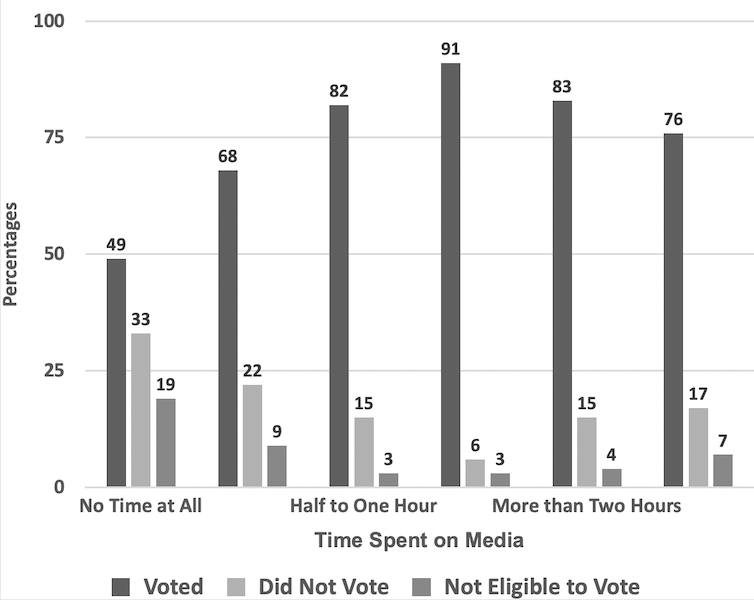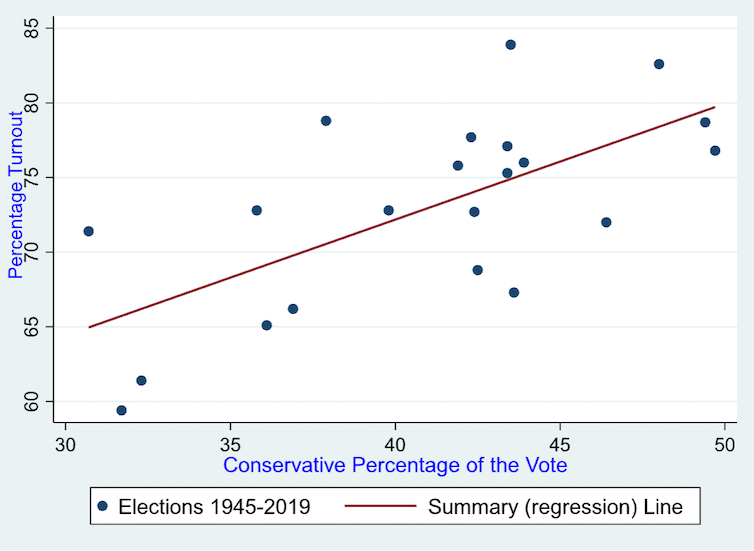Shutterstock/Shyntartanya
In a complete evaluation of reports consumption throughout the globe, a current report by Reuters concluded that “curiosity in information continues to say no, fuelling disengagement and selective information avoidance”. In the 46 international locations surveyed within the report, public curiosity in information has dropped considerably within the UK, France, the US and Spain over the eight 12 months interval from 2015 to 2023.
The examine was commissioned by the Reuters Institute for the Study of Journalism on the University of Oxford, which has been publishing stories on citizen media use in varied international locations since 2012. The fieldwork for the web surveys was achieved by YouGov in early 2023. They present that Britain has a specific downside.
The proportion of survey respondents who mentioned that they had been “extraordinarily” or “very” all for information in Britain fell from 70% in 2015 to 43% in 2023. An identical downside has occurred within the US, though it isn’t as dangerous as Britain. In the US 67% of respondents had been “extraordinarily” or “very” within the information in 2015, however this had fallen to 49% by 2023. Both characterize large adjustments in media consumption of reports over this eight-year interval.
As a outcome, massive numbers of persons are merely disassociating themselves from information about politics and present affairs. They have turn out to be disconnected residents. The report factors out that: “these declines in information curiosity are mirrored in decrease consumption of each conventional and on-line media sources most often”. Clearly, this isn’t simply pushed by folks transferring on-line from conventional media shops, though that is after all occurring.
In the Reuters Institute’s 2022 report, survey respondents gave a variety of explanation why they’ve turn out to be disconnected from the information. Some 29% mentioned they had been “worn out by the amount of reports” and one other 29% they felt “information is untrustworthy and biased”.
Another 36% mentioned the information brings down their temper. These emotions have given rise to a rising group of people that actively keep away from the information. In Britain 24% of respondents did this in 2017 however by 2022 it was 46%. The quantity of people that don’t need to know has doubled in 5 years.
Double disillusionment?
The Reuters report didn’t examine the political results of this growth, which was past the scope of their remit. But there’s a vigorous literature in political science concerning the results of the media on political participation. In an influential e-book, political scientists Shanto Iyengar and Stephen Ansolabehere confirmed that assault adverts, that are such a characteristic of US political campaigns, demobilise folks from collaborating.
We can acquire insights on this level by taking a look at knowledge from the 2020 European Social Survey for Britain. These are very high-quality surveys and supply correct data on what Europeans normally take into consideration politics and the media. One of the questions within the survey requested: “on a typical day, about how a lot time do you spend watching, studying or listening to information about politics and present affairs?”.
Voting within the UK General Election Compared with Time Spent Following Politics and Current Affairs within the Media, 2020

News fatigue and voter turnout.
Reuters/ESS, CC BY-SA
The chart exhibits the connection between time spent by respondents buying details about politics and present affairs and their reported turnout within the earlier common election.
There is a robust relationship between voting turnout and media utilization. Only 49% of people that spent no time in any respect on information gathering turned out to vote whereas 33% of them didn’t vote. In equity, 19% of this group weren’t eligible to vote, because the survey picked up people who find themselves not on the electoral register. Even so, if we have a look at the group who spent one to 2 hours searching for information about politics, 91% of them voted and solely 6% failed to take action. It is evident that media utilization and collaborating in elections are carefully associated.
Further evaluation exhibits {that a} comparable sample is clear in relation to different types of democratic participation. It is people who find themselves partaking with the information which are turning as much as train their proper to protest, for instance.

The Conservatives are hit by low turnout.
P Whiteley, CC BY-SA
Media malaise damages political participation normally and given the large adjustments highlighted within the Reuter’s report it may point out {that a} decrease turnout must be anticipated within the subsequent common election. If we study all 21 common elections in Britain since 1945, there’s a robust correlation between turnout and the Conservative vote. The extra folks vote, the higher the Conservative get together does within the election.
There can be a constructive relationship between turnout and Labour voting, however it’s considerably weaker. Both events could be broken by decrease turnout within the subsequent election on account of media malaise, however the Conservatives could be broken greater than Labour.
![]()
Paul Whiteley has obtained funding from the British Academy and the ESRC.
